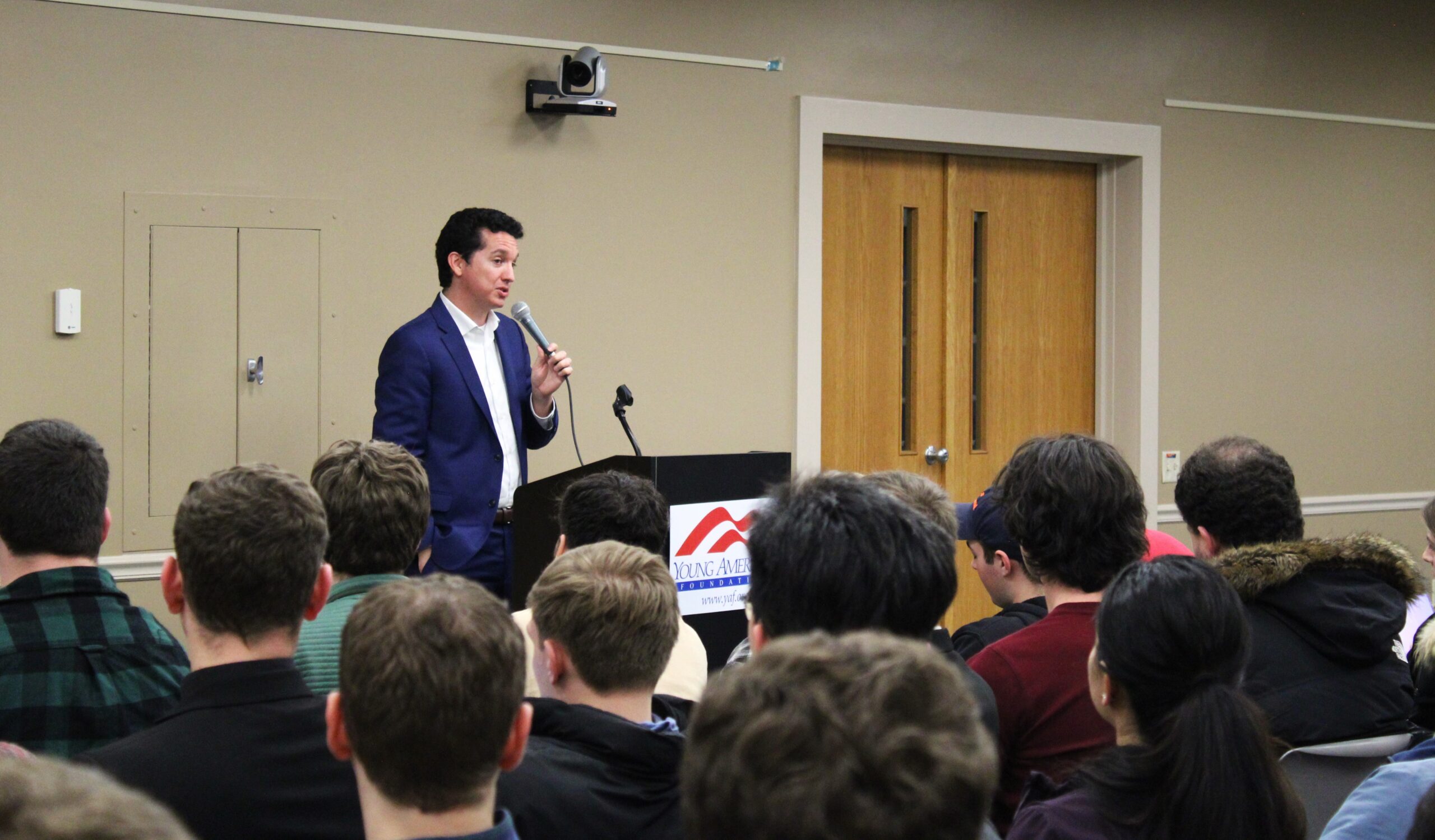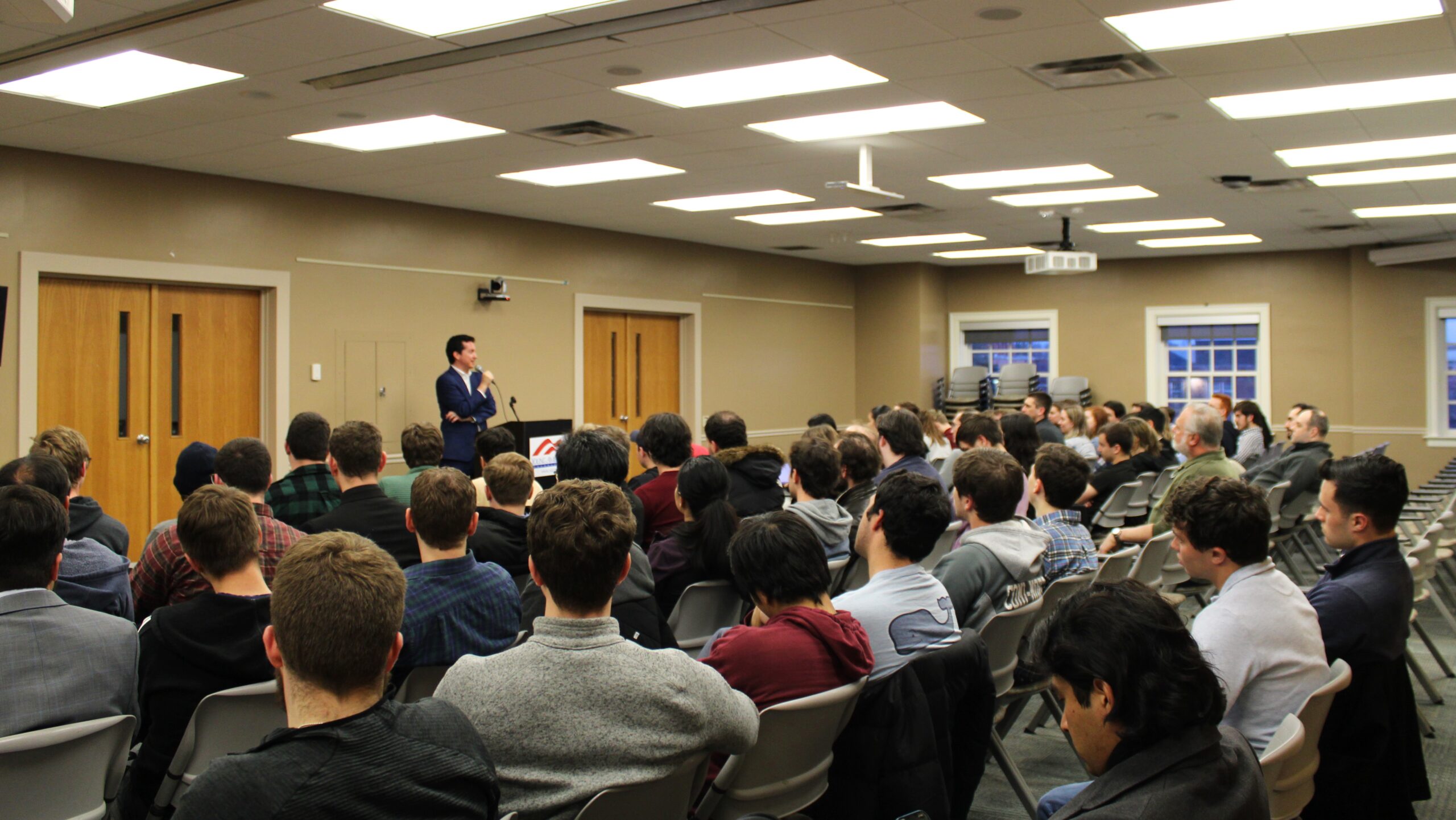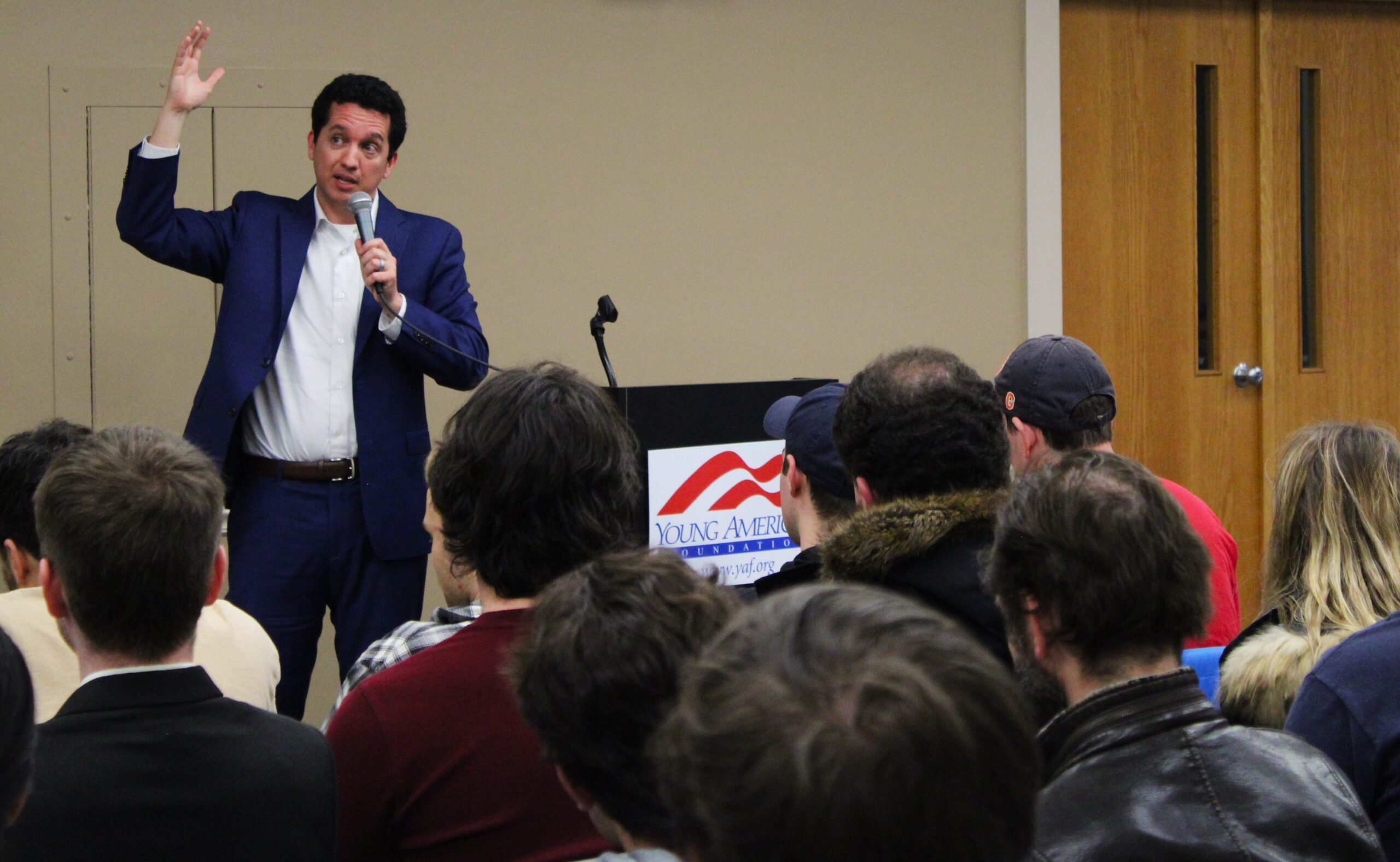
On April 4, the Young Americans for Freedom (YAF) sponsored Catholic apologist Trent Horn to give a lecture titled “Is Abortion Moral?” (Photo Annie Bolenbaugh/The Gettysburgian)
By Katie Lauriello, Lead Copyeditor
On April 4, the Young Americans for Freedom (YAF) sponsored Catholic apologist Trent Horn to give a lecture titled “Is Abortion Moral?”, in which he discussed how to debate the topic of abortion with people who are pro-choice. Horn is currently an adjunct professor of apologetics at Holy Apostles College and has been invited to debate at schools such as the University of California, Berkeley; University of California, Santa Barbara; and Stanford University. Horn has written nine books and runs a podcast called the Council of Trent.
Horn first began the lecture by telling a story of the powerful moment when he and his wife visited the beaches of Normandy for their honeymoon. He related that experience to the film “Saving Private Ryan,” in which the soldiers landing on the island were being carried by floating tanks. When they land, the soldiers are faced with a volley of bullets that many try to dodge by sinking into the water. However, many of these men drowned because of their heavy gear and the panic they felt.
“A lot of times when people who are pro-life who want to defend the unborn engage in the issue of abortion, they feel very similarly. How many of you have ever felt like you were in an emotional or typical conversation and suddenly felt like something that was in over your head, either intellectually, emotionally, or pastorally?” Horn asked.
Horn explained that many times, people who are pro-life who wish to talk about their views on abortion have their focus derailed and the conversation shifted to a completely different conversation. In this lecture, Horn advised from a pro-life perspective on how to talk about abortion to people on the opposing side.
According to Horn, the best way to talk about abortion is to bring the argument to answer one question: What is it?
“Every honest person involved in the abortion debate agrees abortion kills something and ends the existence of something. So the answer to the question of ‘Can I kill this?’ depends almost entirely on the prior question: ‘What is it?’” Horn explained.
Horn noted that many arguments for legalizing abortion are about things such as sexual assault victims, ectopic pregnancies or poverty issues. In other words, Horn stated that the opposition argues that abortion needs to be kept legal because it helps born people.
When talking to people who bring up these issues, Horn said, “Notice that we always ask them, ‘What do you think and why do you think that?’ in order to show there’s a problem with what they believe. When you’re trying to share a worldview with someone, whether it’s theological, ethical or political, it’s not going to be attractive to that person. It’s not going to be good news. Unless they see that their current worldview is bad and inconsistent and illogical, then they’re not going to be willing to give it up for something new unless they think there’s a problem with the view they currently have.”

At the event, Horn gave a lecture and then answered questions from the attendees. (Photo Annie Bolenbaugh/The Gettysburgian)
To get to this issue, Horn employs a technique he calls “Trot out a Toddler,” which uses the four A’s: agree, apply, ask why and ah!
In the first step to “agree,” a pro-life person must establish a common ground with someone who is pro-choice. For example, the opposition argues that abortion should be legal because women should have the right to a choice. To Horn, the agreement would say, “I agree that women have been denied choices throughout history, and they should have the same basic choices that men have been afforded.”
Then he “applied” that reasoning to a two-year-old. In this scenario, he asks the person if the woman has the right to choose to kill a two-year-old. Then, the opposition will say that the woman does not have that right. Finally, Horn “asks why” the woman cannot kill the toddler. The opposing side would argue, as Horn suggested, that the toddler is alive, breathing and born. At this point, Horn argued the issue is not about choice but about what the unborn actually are.
This structure is important, Horn explained, because it shows respect to the other person and acknowledges that they make valid points. It also allows the opposition to conclude that because the pro-life person is not forcing their thoughts down the opposition’s throats.
“People won’t care if the unborn are human unless they see you and I are human,” Horn said.
Horn also advised that if someone wants to argue that women should not be allowed to have an abortion nor should they have the right to vote, they should table the other controversial issue in favor of the primary argument.
When the argument turns back to the central question, Horn then distinguishes between the definition of the unborn from the scientific perception as well as the philosophical one. The scientific argument, according to Horn, specifies that life begins at conception and that the embryo has human DNA inside. Therefore, the human embryo is a living organism. After that, Horn applied the NET (nutrition, environment, time) test, in which giving the embryo adequate nutrition, a healthy environment and time makes it a mature member of the species.
In terms of the philosophical question of what the unborn are, Horn emphasized that it’s necessary to put the burden of proof on the opposition. In this way, they will provide their own definition to which a pro-life debater can use the SLED principle created by Stephen Schwartz. This principle argues against abortion on the premise of size, level, stable environment and development (degree of dependency). According to Horn, many of these philosophical arguments and definitions will fall apart on this basis of questioning.
At the end of the lecture, students had the opportunity to ask questions. One student asked how to reconcile the policymakers who are pro-life yet oppose government intervention that would alleviate the causes of abortion.
“It’s a moral problem before being an economic problem. A lot of people who steal are poor, but that doesn’t mean that just fixing poverty will stop that because a lot of rich people also steal,” Horn explained.
Another student asked Horn’s thoughts on the ethics of in-vitro fertilization.
“The pro-life position would entail that IVF is definitely wrong when it involves the intentional destruction of human embryos. In-vitro fertilization is wrong for other reasons. As a pro-lifer, I think we should ask the question, ‘What rights do unborn children have?’ I think that this child has more than just the right to life,” Horn said.

Horn is currently an adjunct professor of apologetics at Holy Apostles College. (Photo Annie Bolenbaugh/The Gettysburgian)
Horn further elaborated that he believes a child has the right to be born from a married mother and father because both are irreplaceable to the child. The institution of marriage between a man and a woman, Horn argues, protects this right to a mother and father.
“That child has the right to be the fruit of marital love. He has the right to not be the product of a commercial enterprise. Being born outside of marriage is not necessarily something that is good. It’s why we as a society are happy when the rates of people being born outside of marriage declines, because that shows we’re making an improvement in an important social metric,” he continued.
One student asked how to approach people with different abortion beliefs and practices based on their own individual religion. Horn explained that such a case was brought before the Supreme Court before through the Mormon religion, which allowed and encouraged men to have multiple wives. The Court declared that religious freedom is protected within certain limits. According to Horn, abortion counts as one of those limits.
Another student asked Horn’s opinion on contraception and safe sex education. Horn raised the question of what age sex education is taught in schools and what exactly the government would set the curriculum to be about.
In terms of contraception, Horn noted that multiple arguments can be made for and against contraceptives. He said that some may believe contraceptives diminish the nature of sexuality, in fully giving oneself to the other person. He also proposed that contraceptives do not answer the problem of abortion but instead create an “abortive mindset,” or a more negative attitude towards life.
After the end of the questions, YAF hosted a meet-and-greet along with a photo line for people who pre-registered.
